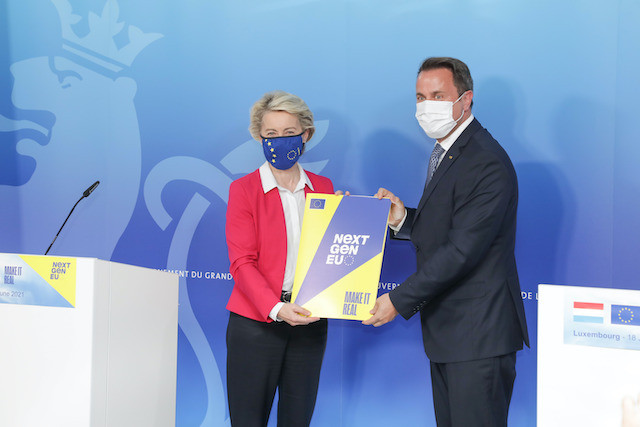Member countries must submit plans to the commission to benefit from the EU’s recovery and resilience facility, with Luxembourg set to receive €93m under the scheme.
Among the investments planned is the decarbonisation of traffic by installing more electric vehicle charging points, affordable and sustainable housing projects and measures to boost digitalisation.
“We are preparing Europe for the coming decades,” Von der Leyen said about the plans.
Luxembourg intends to spend 60% of the EU funds on measures to support climate objectives, well above a 37% EU minimum. Around a third will be spent on digitalisation, again above a 20% EU minimum.
“It is one of the, if not the most, environmentally friendly plan in Europe,” Von der Leyen said. “This is exactly what Europe needs.”
Luxembourg will also receive €145m under the React-EU programme.
While the €252m sum for the grand duchy might seem small compared to the more than €700bn budgeted for the Recovery and Resilience Facilty and React-EU, Bettel did not complain.
“To be the one who gets less money is a sign that our economy did better than a lot of others,” he said. The PM said thinking about Europe only in terms of how much money you can get out of it is wrong. “The principle of Europe is to give.”
Luxembourg, for example, did not draw on EU funds to pay for its partial unemployment programme. Finance minister Pierre Gramegna (DP) said this had been a deliberate choice as Luxembourg was able to finance this measure on its own.
“Luxembourg’s position is a hallmark of the European spirit,” Von der Leyen said, adding that funds were distributed based on the impact of the crisis on different economies. If regions that suffered the most recover better, it will benefit the entire single market, the commission president said.
During her visit to Luxembourg, Von der Leyen visited satellite operator SES to learn more about its quantum communication infrastructure, which the government will help subsidise through the resilience funds.
“This is what the future looks like,” she said, calling the initiative exemplary. Secure quantum communication is thought to be safe from hackers. The SES project will help with cybersecurity and EU data sovereignty, Von der Leyen said.
